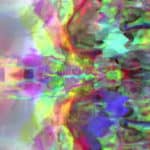Life Lessons from the Torah Portion
Parshat Yitro Exodus 18:1-20:23
Moshe Kempinski
As the people of Israel experienced the awesome and dramatic revelation of G-d’s word on Mount Sinai we read the following description;
“And all the people saw the voices( et HaKolot) and the torches, the sound of the shofar, and the smoking mountain, and the people saw and trembled; so they stood from afar. (Exodus 20:15)
On the words ” the people saw the voices” the Biblical commentator Rashi writes”They saw what was heard , that which is impossible to see elsewhere. — [from Mechilta d’Rabbi Shimon ben Yochai]
What was the purpose of such an experience?
The Sfat Emet teaches ; “… hearing and seeing are two different things, the one unlike the other. … For one who sees, perceives the seen object in perfect manner as it is without any change. But one who hears – the sound changes as it enters his ears and is no longer as it had been sounded. This is the advantage of seeing. Hearing has an advantage in that it brings that which is heard inside the person himself by way of the ear, while seeing is from the outside. (Sefat Emet, Shavu’ot, 5635).
Furthermore our “sight” is accosted with a totality of what is before our eyes. We see many things at exactly the same time. In some ways, we have a sense that we are able to comprehend “the full picture “of an event at one instant in time.
Our sense of hearing necessitates absorbing the experience in a sequential fashion. Listening is a physical action that necessitates listening to one note after another. It perceives the world in a comprehensible fashion and it does so with sensitivity to the nuances of sound and melody. We therefore have to fashion , build and somehow organize all the information we receive from our ears. We do not only hear the particular sounds, but sense the emotions connected to them as well.
To listen is to understand and to spiritually absorb. “Hear O Israel Hashem is G-d Hashem is one.”
One needs to understand context and the whole picture .That is the essence of “seeing”. The possibility of choice necessitates that all the options are laid before every one of His creations. That is to say” in plain sight.”
On the other hand the eyes can lead one astray;
“And the woman saw that the tree was good for food and that it was a delight to the eyes, … and she ate, and she gave also to her husband with her, and he ate.”( Genesis 3:6 ).
At times we may believe that we understand the whole picture and ignore the individual pieces that are critical to achieve that full picture.
The antidote is in finding the power to change that “sight” into “vision”. Sight is the ability to see the physical reality around us, while vision is the power of seeing within and beyond it. How then, is such a metamorphosis achieved?
This antidote is found in the power of “listening”.
We read that:
“Now Yitro , Moshe’s father in law, the chieftain of Midyan, heard ( VaYishma) all that God had done for Moses and for Israel, His people that HaShem had taken Israel out of Egypt.( Exodus 18:1)
What exactly did he hear that prompted his joining Moshe and the people of Israel? The Talmud offers three different possibilities suggested by three different sages. ( Massechet Zevachim 116a)
“Rabbi Joshua says, he heard of the war with Amalek and Rabbi Eliezer HaModa’i says, he heard of the giving of the Torah and Rabbi Elazar says, he heard of the splitting of the Red Sea.”
Rashi combines the opinions of Rabbi Joshua and Rabbi Elazar, and sees both the splitting of the Red Sea and the victory over Amalek as being the impactful events that together brought about the spiritual and life implicating changes in Yitro
In the words of Rashi; “Of what did he hear that he came? Of the splitting of the Red Sea and the war against Amalek.”
These were events that changed the world’s perception of G-d (as we see in Exodus 15:14-16 and in the book of Joshua 2:9-11).
The Kotsker rebbe asks since he only heard what everybody else heard as well then what made Yitro different? He answers that the whole world was aware that the Jews came out of Egypt with great miracles but they did nothing about it. Yitro, however, heard and he came. He heard and he understood. He heard and he acted
That was the power of their experience at Mount Sinai during the revelation of G-d’s words. They heard its power , understood its meaning and saw its eternal context all at the same time.
Seeing is the ability to see the totality of an event and sense its interconnectedness. Hearing is the ability to sense the melody that gives all that interconnected pieces meaning and purpose. That is true for each one of us in our personal lives as it is in the life of a people.
In our days it is Israel that affords the same experience of seeing the sounds . To truly understand what is transpiring in this land and how the whole world is being forever changed by these events one must learn to develop the ability to hear with one’s eyes.
One day I walked out of my shop in the middle of the central square of the Jewish quarter in Jerusalem’s Old City to get some air.
Suddenly, to my right, a large procession of French-speaking Jews walked by singing and dancing with young bar mitzvah boys on their shoulders. They streamed into the square, dancing with Israeli flags and musical instruments. I watched, entranced. At that point, a group of young soldiers who were having a break at the side of the square got up and formed another dancing circle in the middle of the square. Next to me, a young girl turned to her grandmother and spoke in what was obviously a British accent and said, “Bubbie, are you okay?” The grandmother just nodded and watched, with tears streaming down her face.
I wasn’t simply watching a scene unfold before my eyes; I was listening to a Divine message. In order to understand the Divine plan being unfolded in our days, we must truly develop the ability to hear with our eyes.
G-d is speaking using the reality around us . He is communicating with pictures.
LeRefuat Yehudit bat Golda Yocheved

